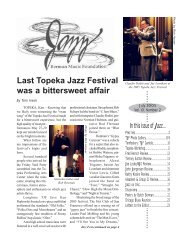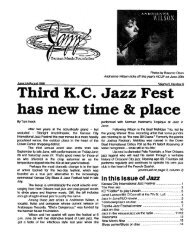Tribute to Russ Long at Jardine's a most wonderful night in KC
Tribute to Russ Long at Jardine's a most wonderful night in KC
Tribute to Russ Long at Jardine's a most wonderful night in KC
Create successful ePaper yourself
Turn your PDF publications into a flip-book with our unique Google optimized e-Paper software.
○ ○ ○ ○ ○ ○ ○ ○ ○ ○ ○ ○ ○ ○ ○ ○ ○ ○ ○ ○ ○ ○ ○ ○ ○ ○ ○ ○ ○ ○ ○ ○ ○ ○ ○ ○ ○ ○ ○ ○ ○ ○ ○ ○ ○ ○ ○ ○ ○ ○ ○ ○ ○<br />
Page 14<br />
Berman Music Found<strong>at</strong>ion Jazz<br />
○ ○ ○ ○ ○ ○ ○ ○ ○ ○ ○ ○ ○ ○ ○ ○ ○ ○ ○ ○ ○ ○ ○ ○ ○ ○ ○ ○ ○ ○ ○ ○ ○ ○ ○ ○ ○ ○ ○ ○ ○ ○ ○ ○ ○ ○ ○ ○ ○ ○ ○ ○ ○ ○ ○ ○ ○ ○ ○ ○ ○ ○ ○ ○ ○ ○ ○ ○ ○ ○ ○ ○ ○ ○ ○<br />
Colorado Correspondent<br />
Jean Reldy: Rem<strong>in</strong>iscences of a jazz p<strong>at</strong>riot<br />
By Dan Demuth<br />
○<br />
Author’s note: Jean Reldy, as of this<br />
writ<strong>in</strong>g, is a friend, his<strong>to</strong>rian of both<br />
jazz and WWII, jazz writer, jazz<br />
booster, and a jazz record and memorabilia<br />
collec<strong>to</strong>r, all <strong>at</strong> 87 years<br />
young. He has had numerous articles<br />
and pho<strong>to</strong>s published <strong>in</strong> jazz public<strong>at</strong>ions.<br />
In the last few years I have<br />
had the pleasure of many gre<strong>at</strong> convers<strong>at</strong>ions<br />
with Jean as they rel<strong>at</strong>e<br />
<strong>to</strong> the above <strong>to</strong>pics. At my suggestion<br />
he agreed <strong>to</strong> let me put some of<br />
them <strong>in</strong> writ<strong>in</strong>g <strong>to</strong> share with others.<br />
COLORADO SPRINGS,<br />
Colo.—With bullets and shells explod<strong>in</strong>g<br />
all around, a young man seeks a safe<br />
haven dur<strong>in</strong>g the Japanese b<strong>at</strong>tle<br />
aga<strong>in</strong>st the Americans’ push <strong>to</strong> retake<br />
Manila. While runn<strong>in</strong>g <strong>to</strong> safety, he is<br />
hit <strong>in</strong> three places with grenade fragments<br />
but survives, only <strong>to</strong> see hundreds<br />
of other men, women and children ruthlessly<br />
shot and killed by the retre<strong>at</strong><strong>in</strong>g,<br />
angered Japanese soldiers.<br />
It is January 1945. Just three short<br />
years earlier, Jean Reldy, a young<br />
Frenchman liv<strong>in</strong>g with his f<strong>at</strong>her <strong>in</strong> the<br />
Philipp<strong>in</strong>es, was enjoy<strong>in</strong>g wh<strong>at</strong> had <strong>to</strong><br />
have been one of the <strong>most</strong> sublime<br />
lifestyles anywhere <strong>in</strong> the world. L<strong>in</strong>en<br />
suits, broad-brimmed h<strong>at</strong>s, two-hour<br />
lunch siestas with even<strong>in</strong>gs alive with<br />
clubs, bars and shows. Lazy days enhanced<br />
by balmy breezes, a now longforgotten<br />
lifestyle th<strong>at</strong> could be enjoyed<br />
by everyone—not reserved for just the<br />
rich and famous. In 1941, with the Japanese<br />
takeover, Jean becomes an unwill<strong>in</strong>g<br />
guest of the Japanese for the dur<strong>at</strong>ion<br />
of the occup<strong>at</strong>ion.<br />
His earliest recollections go back<br />
<strong>to</strong> 1924, liv<strong>in</strong>g <strong>in</strong> his n<strong>at</strong>ive France, and<br />
listen<strong>in</strong>g <strong>to</strong> English dance bands such<br />
as Jack Hyl<strong>to</strong>n and Ambrose via the<br />
Jean Reldy sits <strong>in</strong> his office <strong>in</strong> Colorado Spr<strong>in</strong>gs surrounded by jazz memorabilia.<br />
BBC. His first record was a copy of<br />
Louis Armstrong’s “Take It Easy” b/w<br />
“Jubilee S<strong>to</strong>mp” (on the English<br />
Parlophone label), where his aff<strong>in</strong>ity for<br />
jazz and Louis <strong>in</strong> particular had its start.<br />
This record rema<strong>in</strong>s <strong>in</strong> Jean’s extensive<br />
collection. His serious study of jazz<br />
was encouraged upon acquir<strong>in</strong>g a copy<br />
of Hugues Panassie’s “Le jazz hot” and<br />
their p<strong>at</strong>hs were <strong>to</strong> l<strong>at</strong>er cross.<br />
He was also able <strong>to</strong> <strong>at</strong>tend several<br />
jam sessions, some organized by<br />
the Hot Club de France and fe<strong>at</strong>ur<strong>in</strong>g<br />
such musicians as Django Re<strong>in</strong>hardt,<br />
Frank “Big Boy” Goody, Bill Coleman,<br />
Benny Carter and Coleman Hawk<strong>in</strong>s,<br />
musicians who were currently <strong>to</strong>ur<strong>in</strong>g<br />
or liv<strong>in</strong>g <strong>in</strong> Europe.<br />
But around 1936, Jean began his<br />
Philipp<strong>in</strong>e odyssey. A brief <strong>in</strong>terruption<br />
<strong>in</strong> 1939 found him <strong>in</strong> the French Army<br />
<strong>in</strong> Saigon prior <strong>to</strong> return<strong>in</strong>g <strong>to</strong> Manila,<br />
dur<strong>in</strong>g which time he had his first jazz<br />
article published—of which he still has<br />
a copy.<br />
Curiously, dur<strong>in</strong>g the occup<strong>at</strong>ion,<br />
the Japanese allowed the show<strong>in</strong>g of<br />
American movies, as well as jazz performances<br />
by local musicians. Jean recalls<br />
<strong>at</strong>tend<strong>in</strong>g a jazz program sponsored<br />
by the Red Cross (a black revue<br />
named “Drum Boogie”). He recognized<br />
Bill Coleman and met up with him afterward<br />
<strong>at</strong> a party th<strong>at</strong> lasted until those<br />
fabled wee hours.<br />
Manila was eventually liber<strong>at</strong>ed<br />
and around 1950 Jean immigr<strong>at</strong>ed <strong>to</strong> the<br />
st<strong>at</strong>es, liv<strong>in</strong>g <strong>in</strong> California, then Texas<br />
and f<strong>in</strong>ally settl<strong>in</strong>g <strong>in</strong> Colorado Spr<strong>in</strong>gs.<br />
Once <strong>in</strong> the st<strong>at</strong>es, he quickly <strong>to</strong>ok advantage<br />
of the music available <strong>at</strong> live<br />
performances, while cont<strong>in</strong>u<strong>in</strong>g <strong>to</strong> enhance<br />
his burgeon<strong>in</strong>g record and book<br />
collection.<br />
In L.A., he met up aga<strong>in</strong> with<br />
Benny Carter, and as a guest <strong>at</strong> his<br />
home he was surprised <strong>to</strong> f<strong>in</strong>d out th<strong>at</strong><br />
Carter was also an excellent pianist.<br />
Guitarist T-Bone Walker was another<br />
of the first musicians he recalls meet<strong>in</strong>g,<br />
followed shortly by some personal<br />
meet<strong>in</strong>gs with Duke Ell<strong>in</strong>g<strong>to</strong>n, a man<br />
he describes as an absolutely extraord<strong>in</strong>ary<br />
and beautiful person.<br />
In 1954 he <strong>at</strong>tended a concert <strong>in</strong><br />
Texas and met Armstrong for the first<br />
Pho<strong>to</strong> by Dan Demuth





